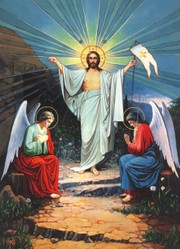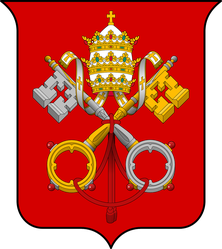Beings have some impact on the world around them, which means that they act, and in some ways their action will be felt by other beings. Christianity believes that God exists and that therefore God can act, powerfully. His action was felt in the creation of the world and in his sustaining it in being, but it is an important Christian teaching that God impacts within the lives of his people, that he influences them directly through the inspiring power of his Spirit. Many Christians will testify that they feel guided by God, often to take a course of action in life.
The rationale behind this is that God must act consistently. If he has created a world that runs by itself, which seems to be the case,consistency demands that he respect the world's autonomy, but his action is to help is people steer a course through it. This is not to totally exclude acts of divine power, but to say that much of what God does consists of steering the course of the world, working in lives by guiding people to the goal that He seeks.
Let us look at the miracles of the Exodus, when Moses led the Hebrews from Egypt. There has been much discussion of the link between these events and the massive Santorini eruption, which sent a tsunami racing around the Mediterranean. It is now suggested that Moses did not cross the Red Sea, but the Reed Sea, which is on the Mediterranean coast of Sinai, and that the Hebrews crossed dryfoot because ahead of a tsunami the water recedes. Obeying God's orders promptly led them to safety, but the chasing force was annihilated. Look also at St Patrick, a slave in Ireland sleeping in a field. He told of being awakened by an angel who told him to go quickly. Obeying instantly Patrick escaped. This is a case of divine guidance, of God's not zooming in to override and and zap, but to steer events in the world.
But Christianity is based on two miraculous acts. According to Benedict the Sixteenth, writing in Jesus of Nazareth, God intervened twice, firstly to incarnate his Son into Mary's womb and secondly to raise Jesus from the dead. These events in salvation history cannot be merely classed as miracles of guidance, but they have implications, for in the presence of Jesus, both in his life and in his post resurrection state, present in the world, an ongoing miracle is happening. God now cannot be simply classed as outide the world, but in Jesus he has established an ongoing link with it. Catholics celebrate the ongoing miracle of the divine presence in the world through the Eucharist, which is celebrated every day of the year except Good Friday.
Without an acceptance of divine action in the world you cannot hold to the main beliefs of the Christian faith. But as I have pointed out, there are different kinds of miracles. Besides the action of God in guiding events, in the New Testament we find healing miracles, which rely on someone's faith, and nature miracles, such as the calming of the storm, which do not. This distinction implies that we cannot speak of miracles in simplistic terms, we must have regard for the different types of them.







 Pilgrimage. A reviewon 06/15/2025
Pilgrimage. A reviewon 06/15/2025
 Leo the Fourteenthon 05/09/2025
Leo the Fourteenthon 05/09/2025
 The Melsonby Hoardon 03/25/2025
The Melsonby Hoardon 03/25/2025



Comments
No, such knowledge is lacking
Thank you for your comment below, in answer to my previous observation and question.
The "other" John intrigues me.
Is there something else by which he is known? For example, is he integral to a Christian community and therefore is identified as "John of [place name]"?
The other John was living at the time that Revelations was written, which is about the end of the first century, so he could not have been present at the crucifixion.
Thank you for your comment below, in answer to my previous observation and question.
John was at the Crucifixion. But was he John the Apostle or the "other" John?
The gospel of John was anonymous, but it was said in the text to be the beloved disciple. Tradition names this disciple as John, but the text of John 11 describes Lazarus as the man you, Jesus, love. The first letter of John is written in the style of the gospel, so the gospel and the letter may have similar authors, but the other letters of John are in a different style. Scholars have argued this issue for years.
Thank you for your comment below, on Jan. 22, 2020, in answer to my previous, same-day observation and question.
That gospel-writing John and John the beloved disciple are not John the Apostle intrigues me.
Who is the "real" beloved, gospel-writing John?
Terata is used in Acts occasionally.There are no specific miracles associated with the word terata.
John differs because its author, the beloved disciple, almost certainly not John the Apostle, was a more deeply educated intellectual than the other evangelists were, so he wrote a highly literary piece that mixes the story with theology.
frankbeswick, Thank you for the practicalities and products.
It appears that terata (wonders) is the rarest of the trio made up by dynamis (powerful act) and semeion (sign). Do you know where it is used and what the associated miracles are?
It's also interesting that John uses semeion (sign) whereas the other gospels use dynamis (powerful act). Isn't it thought that Luke's and Matthew's gospels drew upon Mark's? Why would John -- because of his special interactions with Jesus and Our Lady Mary? -- be so different from the others?
We have to ask ourselves how the saintly intercession works. The model in which people plead with God until he gives them what they ask or seems dubious to me. I suggest that a more convincing model is that God works through holy people, such as saints.
Indeed there are multiple definitions in use. The religious definition is the basis for canonization, for there must be evidence of more than one miracle associated with the intervention of the candidate. So, with so many canonized saints, there have been quite a few miracles in even recent times.